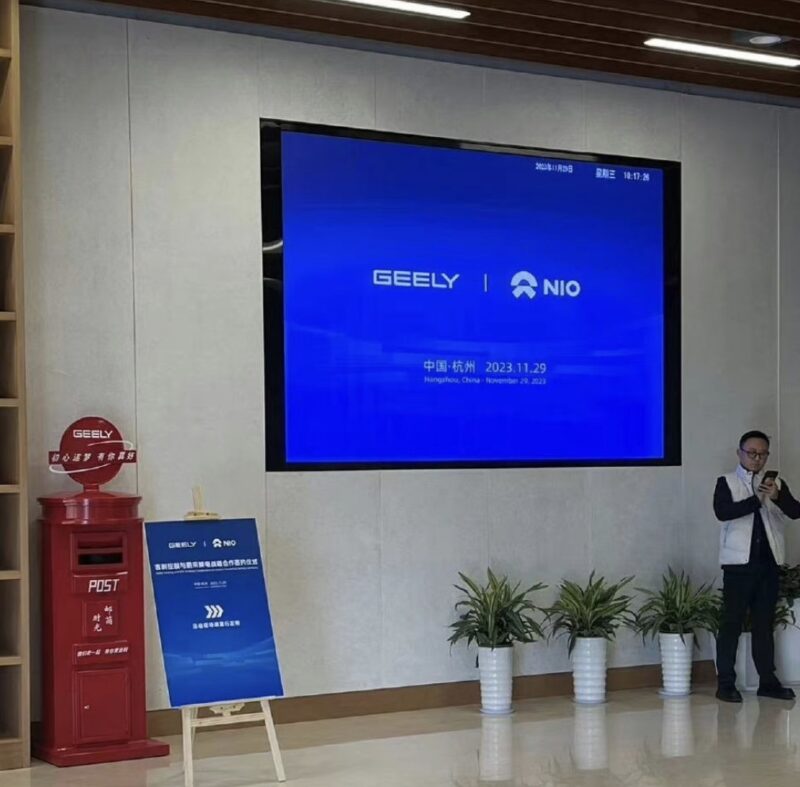Geely and Nio sign a cooperation on battery swapping business
Geely Holding and Nio signed an agreement on cooperation regarding the battery swapping business in Hangzhou today. Geely previously announced they will have 5,000 battery swap stations by 2025 as the company has two sub-brands producing EVs with swappable batteries.
According to China Financial, Geely and Nio will cooperate on developing battery-swapping standards, promoting battery-swapping technology, and swapping network construction. After state-owned Changan signed an agreement with Nio last week, Geely would be Nio’s second Power Swap Stations (PSS) partner.
Moreover, the video of Geely Holding founder and CEO Li Shufu and Nio’s co-founder and CEO William Li joking on the street prior to the signing ceremony appeared online. The video is from Hangzhou, the capital of Zhejiang province, where Geely is headquartered, and the two parties signed the agreement.
In September 2021, Geely Group reported they aim to have 5,000 battery swap stations for electric vehicles globally by 2025. However, since then, the company has been silent on its progress.
Geely will most likely use the battery swap model for its ride-hailing business as it operates multiple cab-related services and manufactures several EVs focused exclusively on taxi drivers.

Zhejiang Geely Holding Group Co., as the full name goes, currently has two brands producing EVs with battery swap functions. Cao Cao Auto and Livan. Cao Cao is a ride-hailing service like Uber, and Cao Cao Auto makes cars for their drivers. The latest model is Cao Cao 60, which is pretty popular among cab drivers; unfortunately, it got into the headlines in June for dropping its battery pack while driving on the street.
The second swappable brand, Livan, launched the Livan 7 in September with lidar and a swappable battery for 117,700 – 173,700 yuan (16,600 – 24,600 USD). It is the cheapest electric passenger vehicle globally with lidar and also the cheapest vehicle that supports battery swap. All Livan 7 trims and versions support battery swap. Livan is a joint venture between Geely and Lifan Technology.
Geely Group is a Chinese auto-building giant operating many brands such as Lynk&Co, Zeekr, Livan, Radar, Lotus, Polestar, Volvo and Smart. Aside from Lynk&Co and Volvo, which still produce some ICE vehicles, all other sub-brands produce NEVs (New Energy Vehicles), the Chinese term for BEV and PHEV. Geely Holding also sells cars under the Geely Auto marque, which is divided into three series: Star, Geometry, and Galaxy.
Geely Holding sold over 1.1 million cars in 2023 (January – October), almost 350 thousand being NEV. 31% of all Geely delivered are electric vehicles.
On November 29, Nio had 2,163 battery swap stations and conducted nearly 32 million battery swaps in China. In Europe, Nio operates about 30 PSS.
Editor’s comment
On May 10, Changan Automobile and Geely Holding signed a strategic cooperation framework agreement to promote China’s EV brands and overseas development cooperation on EV powertrains and vehicle intelligence. The press release said that “strategic cooperation is seen as a model of alliance between industry giants.”
With Nio, Changan, and Geely signing cooperation with each other past this year, it almost seems that a new block against BYD’s hegemony is forming in China. And who knows, maybe with such a massive electric vehicle output as Geely and Changan have, Nio’s core business might become a battery swap network provider. Because for sure, more partners are coming.




![Chinese EV dropped the whole battery pack while driving [Video]](https://carnewschina.com/wp-content/uploads/2023/06/006t8Fgily4hfgh1v7zs4j30u01400w8-696x411.jpg)